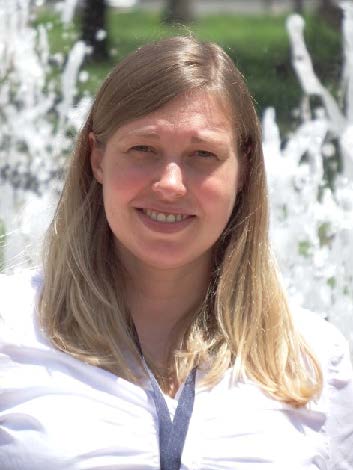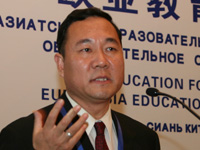About the Award
The International Academy for Intercultural Research (IAIR) seeks to honor and recognize young scholars who are making significant contributions to the field of intercultural research/relations.
Early Career Award Specifications
This award recognizes individuals who have made substantial contributions to the field of intercultural relations early in their careers.
The Prize
It is expected that the awardee will present their research at the upcoming conference at which the award will be announced.
The awardee is normally invited to give a plenary address during the Academy’s biennial conference, after which he/she is given an honorarium of US$500.00. The next award will be given in 205 during the Academy’s conference in Brisbane, Australia.
Eligibility
Individuals are eligible for this award if they have made substantial contributions to intercultural relations within five (5) years of receiving a PhD or equivalent advanced degree. Those eligible for this award cycle should have been awarded their PhD no earlier than January 1, 2020. The most deserving intercultural relations researcher whose achievements have occurred within a five- (5) year period after receiving his/her terminal degree is recognized for his/her outstanding early contributions.
Promising candidates can nominate themselves or be nominated by a member of the Academy.
Nominations
As part of the nomination, the applicant or the member doing the nomination should include:
- A cover letter (of about 500 words) where the applicant/nominee:
- Highlights his/her contribution to the field of intercultural research together with reasons for why he/she is worthy of the award.
- Outlines their involvement with the academy beyond Academy membership (e.g., conference attendance, involvement in the summer school, reviewing for IJIR, committee membership etc.).
- Highlights his/her contribution to the field of intercultural research together with reasons for why he/she is worthy of the award.
- Outlines their involvement with the academy beyond Academy membership (e.g., conference attendance, involvement in the summer school, reviewing for IJIR, committee membership etc.).
- A detailed CV of the nominee.
- Evidence that the PhD was completed within the last 5 years. (This can be a letter from the thesis supervisor/dissertation chair).
- A list of representative publications (that can be reviewed by the awarding committee)
- Documentation of Academy membership that is valid for at least the entire year of the nomination (i.e., membership should be valid till at least June of 2025).
- The names, and addresses (both physical and email) of two other people who may be contacted for reference letters.
The application must be submitted electronically (Microsoft Word preferred) to the Chair (Dr. David Sam
The deadline for submission of nomination is 31st December 2024.
The Conflict of Interest Statement for this committee can be found here
Conflict of Interest Statement
EARLY CAREER AWARD COMMITTEE
Statement on Conflict of Interest
The International Academy for Intercultural Research (IAIR) seeks to honor and recognize developing scholars who are moving the intercultural and cross-cultural research fields forward into the future. This award recognizes individuals who have made substantial contributions to the field of intercultural relations early in their careers. This circle of research is small compared to other disciplines, and academic scholars who study this field almost always have co-published or had some close interactions with other scholars on a similar topic.
It is therefore crucial that the evaluation process for the Early Career Award be conducted in a professional manner that is objective, fair, and transparent. The Award is given out once every 2 years. Approximately 6 months prior to the IAIR Biennial conference. A call for Award Application is put out and applicants MUST be nominated by a Fellow of the Academy. Individuals are eligible for this award if they have made substantial contributions to intercultural relations within five (5) years of receiving a PhD or equivalent advanced degree. As part of the nomination, the nominee’s current curriculum vitae; several of the nominee’s representative publications; and the names, and the addresses of two other people who may be contacted for reference letters.
The Early Career Award Committee members are required to evaluate all submissions in a manner that is professional and honourable.
Prior to the evaluation, all committee members must declare a Conflict of Interests (COI), if (i) they know of any applicant personally, (ii) whether they had previously or are currently working jointly on any research projects and/or publications, and (iii) if they nominated any of the people and/or is listed as a potential reference letter provider. The statement will not disqualify a committee member affected by (i) and/or (ii). However, a committee member making a nomination/or writes a recommendation for a nominee would abstain from the evaluation process.
Importantly, other than point (iii) the objective of this declaration is to hold individual committee member accountable for their judgement, such that it is unbiased and visible to all.
The disclosure on COI must be made to the Chair after receiving the nominees’ documents, but before the evaluation commences. The Chair may require an Award committee member to recuse from evaluating an applicant’s submission if there is a compelling reason for doing so, for instance, the nominee and a committee member have published together. Should ALL, or several committee members have some form of COI, then the executive council of the academy will constitute an ad-hoc committee to see to the evaluation.
The Award committee member who has a COI shall evaluate all submissions except the applicant’s whose abstract is affected by a COI. This Award committee member shall provide to the Chair, details of his or her assessments and benchmarks used in evaluating all abstracts, and these documentations shall enable the appointed external reviewer to make an informed judgment on where the COI-affected abstract stands vis-à-vis the rest of the submissions.
The process and declaration on Conflict of Interests is a transparent one. It will not disadvantage any Award committee member who may a scholar eligible for the award but at the same time, it will hold the Award Committee and the Chair accountable for their decisions, and to uphold integrity, impartiality, and transparency.
Given the Executive Council is required by the by-laws to approve the designee(s) of this award, there exists the potential for a conflict of interest. In the event that a member of the Executive Council has a conflict of interest, then they must declare that conflict of interest and abstain from the approval vote by the Executive Council.
Current Awardees

Kinga Bierwiaczonek
University of Oslo
As a social and cross-cultural psychologist, I conduct research on two primary themes: the psychological aspects of migration, acculturation, and cultural diversity, and the impact of conspiracy beliefs on individual behavior. I completed my double Ph.D. from Vrije Universiteit Amsterdam, the Netherlands (2018), and ISCTE – University Institute of Lisbon, Portugal (2019). Currently, I work at the University of Oslo where I lead a large-scale project, funded by the Research Council of Norway, which provides a comprehensive perspective on immigrant well-being and social functioning using advanced meta-analytical techniques. My research is focused on understanding the interplay of individual, social, and cultural factors impacting cross-cultural adaptation in different groups of migrants, investigating outcomes such as socio-cultural functioning, psychological well-being, and somatic health. I also have a keen interest in research methods, especially meta-analysis.
Previous Awardees
 |
Jonas R. Kunst University of Oslo |
 |
Agnes Szabo Victoria University of Wellington |
 |
Maja Schachner |
 |
Dr. Nicholas Rule University of Toronto |
 |
Dr. Melody Manchi Chao Hong Kong University of Science and Technology |
 |
Dr. Julie Spencer-Rodgers University of California-Berkeley |
 |
Wenshan Jia Chapman College, USA |
 |
Ronald Fischer Victoria University, New Zealand |
 |
Hee Sun Park Michigan State University |
